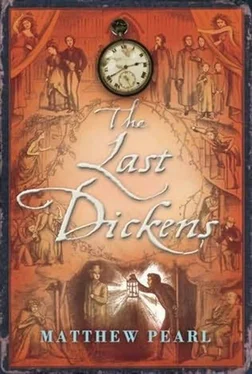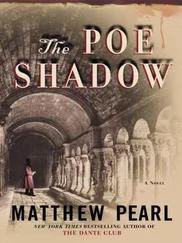“I have come to be fond of you, Tom. Do not abandon saying your private prayers, as you likely do-I never have myself, and I know the comfort of it. If I should live to publish more, I'd want you to read my books, whether or not you can make out that they have anything to do with your own life. Will you do it?”
“Yes,” Tom said.
“Good, you will be a reader I am proud of.”
When he was finished gathering his belongings, Dickens entered Dolby's rooms and closed the door behind him. Tom waited with a racing heart. At every creak or shuffle or murmur in the hotel walls, Tom imagined the intruder bursting inside and the ensuing capture. He could not help but also imagine the fury that Dolby would exhibit were the manager by some chance to return early to Boston. He imagined Dolby telling the overly proper Mr. Osgood about it, and predictable Osgood telling his partner, Mr. Fields, and furious Fields sending for the police to come back in force and this time to lock Tom up.
As the night passed on uneventfully, Tom began to think he'd been wrong and that Louisa Barton was not to make an appearance. He had scared the tired novelist enough for one night. He knocked lightly on the door adjoining to Dolby's rooms where Dickens was sleeping.
“Chief,” Tom whispered. He opened the door slightly. “Chief, I think we have given this a sufficient trial. Do you wish to reclaim your bed?”
There was nobody inside. The bed had been slept in, but the bedclothes were only slightly disturbed. It was not unlikely he had gone out for another breather. Unless Louisa Barton had shown up as Tom had expected.
Tom went into the hallway to question the waiter who had been guarding Dickens's door, but the waiter was nowhere to be seen either. Descending the stairs, he found a night clerk and sent for the fugitive waiter, who came from the barroom with a glass of brandy in his hand.
“What are you doing in the bar?” Tom said to him.
The waiter studied Tom with offense. “You a temperance man now?”
“It's three in the morning. Why aren't you on guard at Mr. Dickens's room upstairs?”
“There's nothing to guard, is why. Mr. Dickens left.”
“When?” Tom asked.
“Not a half hour ago. Said he wanted to get out for a little exercise. Went out the back stairs.”
Tom knew at once how foolish he had been. He had never persuaded Dickens about the danger of the intruder at all! Dolby's enraged voice now shouted in Tom's mind and had one thing to say: You lost the Chief, you lost Charles Dickens!
Outside, Tom found a hotel janitor who had seen Dickens leave through the back entrance, signal for a hackney cab and drive away. The janitor said that the coach drove north with Dickens inside. Tom began to walk toward the river looking for any signs of the novelist or his hired cab. The streets were nearly empty this early. A rickety wagon drove by hauling bread. Tom pulled himself onto the baker's open wagon, where he crouched so the stacks of rolls blocked him from the driver's view. After jumping back to the street and surveying his surroundings, Tom gave up his search as fruitless.
Then he heard an unexpected sound in the morning stillness- a groan. The noises came a few paces down from the riverbank. Tom followed the sounds and found a red-haired man facedown in the rocky, icy bank. Likely a local drunkard who had lost his step. Tom pulled the man onto higher land and could see that he had been battered, his clothes shredded in spots in some kind of assault. His head was uncovered and there was no hat nearby.
“What happened?” Tom asked, loosening the man's clothing around his chest.
The man moaned more, trying to say a word. “Coach!”
“I'll call for help.”
Before Tom could move, the man grabbed his collar determined to make himself understood. Through his labored breathing and dizzy spells, the man was able to communicate that he had been driving his coach when he saw a woman gesturing for help. She was holding her ankle as though in great pain. When the man stepped down from the box and started for her, she ran past him, took his hat, and leaped onto the driver's box, grabbing the reins. He scrambled back toward the carriage, but she whipped the horses into a frenzy, trampling him. She then stepped down and pushed the staggering man tumbling over the embankment.
Tom could see through the ice and black mud that the man was wearing the outfit of a hackney cabdriver. “Did you have a passenger in the carriage?” he asked.
The driver nodded.
“Who? Was it Charles Dickens?”
Coughing overcame the driver, and he sprayed out blood.
“Can you stand?” The attempt failing, Tom put one arm under the half-frozen man's neck and one under his legs and lifted him with a great heave. He carried him to the street.
Just then, a brougham carriage came roaring back in the direction of the hotel. Tom tried to signal for help, but it careened wildly past at a breakneck speed, far faster than the legal limit of a slow trot. It passed too rapidly for Tom to see anything but the driver's hat and to observe that there were no passengers to be seen. But the cabman that Tom was holding stretched his hand out at the sight of the vehicle.
“Stay calm, fellow,” Tom said.
Bracing his legs to carry his load farther up the road, Tom found the driver of a truck watering his two blanketed horses at a hitching post.
“This man needs help immediately. Take him to the hospital,” instructed Tom, laying his burden down gently. Then Tom began untying one of the truckman's horses, saying, “I need to borrow her.”
The confused truckman was too startled to object, and Tom climbed up onto the horse without a saddle and kicked her into a launching gallop.
Tom was soon in the immediate wake of the speeding carriage that had passed them. When he was even with the rear of the carriage, Tom breathed in deeply and leaped off the horse, grabbing the back of the chaise. With one hand hanging from the top of the chaise, Tom swung around, unlatched the door, and threw himself inside. The chaise was not empty. There was Dickens on the floor.
The Chief was sprawled out, out of view of the window. His head rested on a pillow-the stolen hotel pillow from Parker's!
This moment had been dreamed up all along.
There was Louisa Barton's carpetbag full of bundles of ragged manuscript pages. Tom took up the title page. A New Book of Job by Charles John Huffam Dickens was scrawled out in a cramped hand. Also in the bag were slippers, curlers, a mirror, pomatum, and rope.
“Chief, it's Tom Branagan. Are you hurt?” Tom whispered and shook him.
“Slow, slow please,” Dickens mumbled in reply.
Tom realized that Dickens was not bound or constrained physically. But Dickens's extreme torpor was the same that had come over him when in any fast conveyance.
Just then, the horses came to an abrupt halt, the carriage lifting in the air.
Dickens began to try to speak, but Tom signaled for quiet. The novelist was insensible and confused-plus Tom was not armed but knew Louisa Barton could be. If the kidnapper saw him there, she could become desperate.
The brougham carriage had two rows of seats facing each other and space beneath each of the rows for luggage. Hearing the driver step down from her seat, Tom slid to the floor and rolled beneath one of the seats into the luggage space. He grabbed Dickens's walking stick and pulled it against his body where it couldn't be seen.
“Here we are,” said Louisa theatrically, as she opened the door. Her abundant hair was half stuffed under the stolen driver's cap, which she now removed and threw aside. “Chief, you'll need to wake yourself now. You'll want to be spirited, spirited and energetic as always you are, to show what you're all about. This will beat the other readings for those groundlings hollow, hollow, hollow!”
Читать дальше












